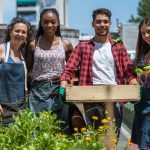Posted by: Francis Koster Published: March 31, 2020
Helping your kids start a garden will help manage Corona Virus impact
 All eyes are watching for the impact of one invisible threat to America.
All eyes are watching for the impact of one invisible threat to America.There are actually two threats coming.
Some food will become hard to get.
America imports one third of its fresh vegetables and more than half of its fresh fruit from from countries that already have the coronavirus epidemic.
Importing food is not limited to acquiring food from other countries - the majority of America's heavily populated east coast states import fruits and veggys from west coast states.
Even if the infection curve is flattened, the resulting year-long impact on the workforce makes it is obvious if the prediction of two-third of the workforce getting ill over the coming months, coupled with others staying home from work to avoid the disease, will result in some kinds of food becoming scarce.
When schools close here, parents will be going crazy because their kids will be unable to leave their yard to play. Family members will compete with each other for computers for school work, entertainment and to work at home.
How do we give the kids meaningful educational work to do at home when schools are closed, and at the same time help solve a potential food shortage?
Have them plant a garden. This could be one of the best educational experiences they can have at this time.
Tell your kids they have to take some responsibility for their family’s health and safety – that we (and they) are not powerless. They can grab a shovel, and grow food.
Our country has faced food shortages before. During the Second World War, an estimated 20 million “Victory Gardens” (backyard gardens) produced roughly 8 million tons of food—which was the equivalent of more than 40 percent of all the fresh fruits and vegetables consumed in the United States at that time.[2]
When a child buys vegetable seeds, you get to teach them about the correct season to plant, and harvest. They may be inclined to take a whole seed packet and dump all the seeds into the ground at once. Instead, they should figure out how to space out the lettuce, beets, or carrots by planting a few seeds a week for two months – and contribute to the health of your family as they harvest all summer long. (You can find a good planting/harvesting schedule by googling North Carolina Planting Calendar.)
You can also turn this into a chance to learn math. Since some veggies grow quickly, and some take a long time to grow, ask the kids to figure out what seeds to plant to ensure a steady stream of veggies until the end of the growing season in late fall of 2020. Have them test the chemistry of the soil, and experiment with how two of the same kinds of plants grow differently in different soil.
Have them look up the nutrition content of things they can grow, and then have them compare it to the snacks they buy – and point out that growing a garden can lead to better brains, smaller waists, and better coordination.
Most people have not wrapped their head around the fact that this corona virus situation will be going on for a year. In that time period you could teach them how to raise chickens to make eggs for breakfast. There are grandparents who know how to do this, who can teach them by using video calls on their cell phone.
On Tuesday of this week, Dr. Brian Monahan, Congress' in-house doctor, told Capitol Hill staffers at a close-door meeting that he expects 70 to 150 million people to be infected in the United States — roughly a third of everyone in the country [3]. They will have to be isolated for weeks.
Early indications are that of those who become infected, 1 in 5 will need to be hospitalized for an average of 10 days.[4] Families will be unable to work, and will be very busy tending to other family members.
Many people who help provide us with food will be unable to do so.
We cannot stop the epidemic – there is no vaccination.
We can slow it down by hand washing, stopping hand shaking and hugs, and voluntary isolation. These measures do not stop the spread of the infection – and it probably does not lower the number ultimately infected.
So think about this: where is your food going to come from when trucking lines shut down, canning factories cannot get help, and grocery clerks are out sick, or when you do not want to go shopping for fear of catching the virus?
We can grow food. This is a skill that almost all Americans, including most kids, had at one time. It is time to restore that skill. Not tomorrow – now.
As a parent, there are a lot of YouTube videos you can learn from and many websites. You can send the bored and restless kids out to weed the garden, pick their own tomatoes, and teach self-reliance, all the while protecting the family. When you go to buy seeds, you can teach them to only take what you need, and leave what you don’t need for others.
If you step up as a parent and grand-parent (or good neighbor), we grow a stronger, compassionate, and healthier next generation.
[1] https://www.fda.gov/food/importing-food-products-united-states/fda-strategy-safety-imported-food
Authored by Francis Koster Ed. D.
………………………………………………………………
Francis Koster Ed.D. lives in Kannapolis N.C. He is a retired pediatric healthcare administrator who has spent his working life studying threats to the basic life support systems of air, water, food, and fuel and their impact on human health.
Copyright © 2020 The Optimistic Futurist. All Rights Reserved.
Francis P. Koster Ed.D.
Proven local solutions to national problems.
CONTACT
Copyright © 2023 America's Optimistic Futurist